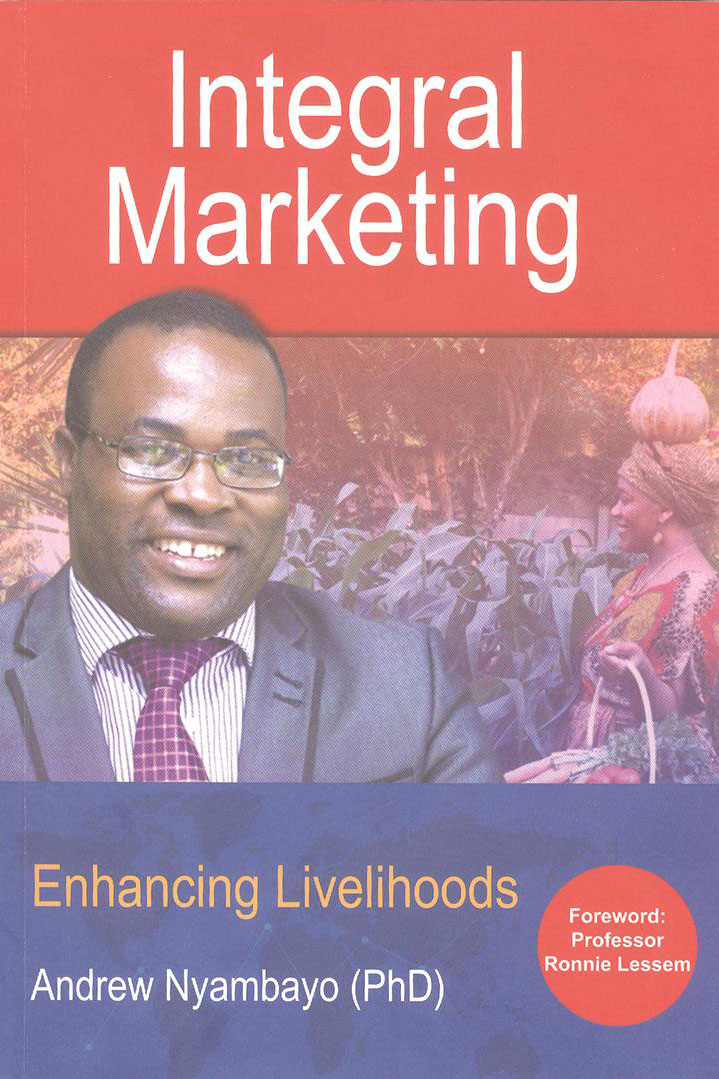
The Sunday Mail

Mtandazo Dube Book Review
In “Integral Marketing: Enhancing Livelihoods”, Dr Andrew Nyambayo displays his profound understanding of the struggle to survive both at personal and corporate level. For him, the desire to uplift marginalised people is not about donations and PR gimmicks disguised as social responsibility – but through working with them.
This is not one of the lightweight “inspirational” books that have flooded bookshelves: this is a feast for the hungry mind. And not just any mind, but an entrepreneurial one, an academically hungry one (not one forced to study).
The book is of immense benefit to anyone who wants to do business in Africa’s large marginalised communities to create win-win situations. Though he speaks of marketing and new technologies, Dr Nyambayo’s arguments feed into the Zimbabwean Government’s policy on community share ownership schemes, effectively blending documented management theory, practice, and common sense with case studies.
The author is a renowned business leader and strategist who has spent more than 20 years working in the telecommunications industry at home and abroad. The book begins with an overview of marketing and then touches on how mobile phones, for instance, have transformed communities. It also articulates how organisations can access market information from rural people in an effective manner.
According to Dr Nyambayo, integral marketing is about identifying business opportunities and satisfying them through humane exchanges for mutual benefit. Writes Dr Nyambayo: “Companies that build people and communities seek reasonable profits. They genuinely care for the environment instead of minimum compliance with laws and regulations. Good companies support community projects as their responsibility not as public relations gimmicks.”
He goes further: “…marketing should be integral and inclusive by nature, accommodating the rich and poor, educated and non-educated, rural and urban people. The world is yearning for marketing with humanness that can develop and promote useful and affordable products that are accessible to all the sections of our society including the lower ‘strata’.”
He posits that at the heart of integral marketing are business/organisational values; and shares how firms can get insights from customers for developing new products and services. To get market information from rural communities, Dr Nyambayo recommends researching with people rather than on people, pointing out that all people are able and happy to share their experiences and knowledge through participation rather than being surveyed with questionnaires.
Dr Nyambayo says companies should change their business models in terms of how they create value, generate revenues and serve rural communities. Rather than seek short-term profits, companies should focus on sustainable development of the market and uplift livelihoods for future profits.
Launching the book in Harare recently, guest speaker Dr Joshua Chinyuku of Astra Holdings said: “Integral Marketing is a book that helps us achieve multiple goals. Firstly, by applying humane principles (hunhu) organisations are capacitated to develop products and services that are useful and affordable thereby meeting the needs and aspirations of customers.
“Secondly, value laden products that are user friendly and enjoyable lead to physical, social, economic, psychological and spiritual emancipation. Thirdly, as customers readily access products for re-sale or personal consumption their wellbeing is enhanced. This is a significant step in achieving Sustainable Development Goals.”
While the book at first reads like a propaganda manuscript for telecommunications company Econet, it becomes clear that Dr Nyambayo is merely drawing on his intimate knowledge of the company.
He says of his experience at Econet, “They embraced the popular idiom, ‘chengaose manhanga hapana risina mhodzi’ (‘collect all the pumpkins because there are none without seeds’). Indeed no opportunity is too insignificant to be neglected or ignored. “Therefore, incorporating the excluded and marginalised customers is bringing all the pumpkins through inclusive marketing.”
Do not deny yourself the wealth of knowledge on offer: grab your copy at a bookstore or on Amazon.com.




